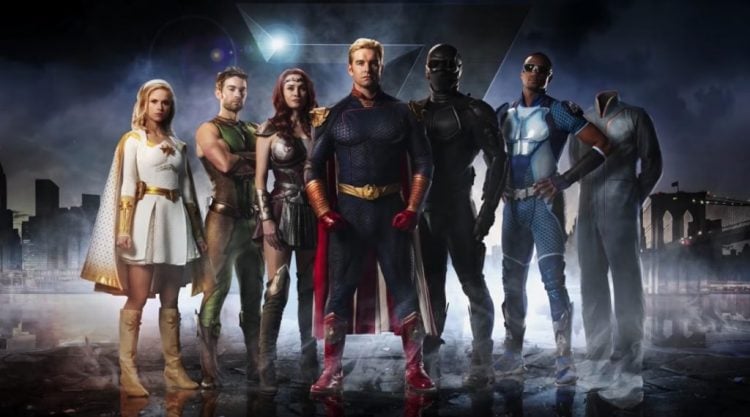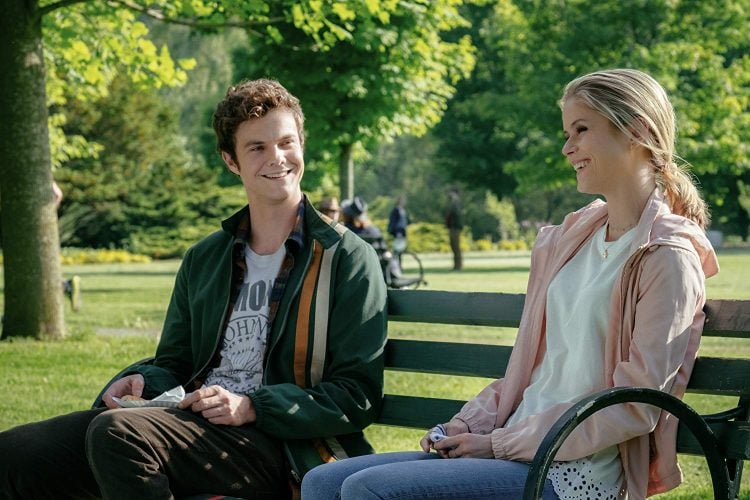
“You can’t do this. You don’t have the fight, you never have.”
For the better part of twenty years now, the superhero genre has become a staple in mainstream entertainment. With a few notable exceptions though, these heroes represent an ideal of what a superhero should be: courageous, selfless, and dedicated to doing the right thing. Yet as much as we’d like to believe that every gifted individual would become this paragon of virtue that is not taking into account the often selfish nature of humanity. The Boys, a wildly entertaining and somewhat cynical representation of this superhero genre, embraces this and the often quoted aphorism of how power corrupts.

Based on the comic series created by Garth Ennis and Darick Robertson, The Boys follows a group of the most unlikely rabble whose sole purpose is to lay the discipline to Supes when they get out of line. The first foray into this new world, “The Name of the Game” is a brilliant introduction to the commercialized world of Vought—the company that represents the Supes—and their golden calf, the Seven (unabashedly modeled after DC’s Justice League).
The avatar for audiences is Hughie Campbell (Jack Quaid, Logan Lucky, Vinyl), who violently discovers the collateral damage that is often kept quiet as the Supes go about their crime-fighting duties when his girlfriend Robin (Jess Salgueiro, Workin’ Moms, Saving Hope) is—well, there’s no other way to say it—exploded by a collision with the A-Train (Jessie T. Usher, Survivor’s Remorse, Independence Day: Resurgence ), who distractedly runs through her. Watching his girlfriend rendered to human pulp is bad enough but the worst of it comes when Hughie hears the lies delivered by Vought’s PR team, led by Madelyn Stillwell (Elisabeth Shue, Leaving Las Vegas, CSI, Adventures in Babysitting) Hughie becomes disillusioned and understandably bitter.
Enter Billy the Butcher (Karl Urban, Lord of the Rings, Dredd): a shady character who uses Hughie’s broken spirit and anger to further his own agenda. Though his scheme to have Hughie bug the Seven’s Tower doesn’t go according to plan, in the end, Hughie and Butcher do nab themselves, Translucent (Alex Hassell, Suburbicon, Two Down), a bona fide member of the Seven.
Whereas Hughie represents the common man, Annie/Starlight (Erin Moriarty, Jessica Jones, Red Widow) is a ‘super-abled’ Iowan who, instead of aspiring to be a model, doctor, or athlete, has always dreamt of being a Supe. After years of entering Miss Super Hero pageants and dedicated training, Annie realizes her dream and is accepted into the Seven. Her idealism is shattered though when the Deep (Chace Crawford, Gossip Girl, The Covenant) uses his position as the second most influential member of the Seven to pressure Annie into a vile and degrading sex act that has her questioning who she really is. As fate would have it, she finds herself next to a similarly adrift Hughie. The chance to be open and honest with a stranger helps the two find the strength and fortitude to work past their horrid circumstances and glean a bit of truth: neither a single action nor a lifetime of inaction defines the person you wish to be. It’s what you decide to do, going forward, that truly makes you the person you see yourself as.
Despite the pessimistic portrayal of those that are supposed to represent the best of humankind, “The Name of the Game” offers a grim yet accurate depiction of the human condition. We see it every day in athletes, entertainers, politicians, and those in positions of authority; while many do their best to represent the exalted position, there are those that take advantage of the power they’ve been blessed with/given for their own selfish desires. Though they are the minority, the damage they do to the whole cannot be overstated and picking these deadly weeds from the greater whole is necessary lest we fall deeper into that pit of disillusionment. In our society, no one body is capable of cutting out these cancers, but for these series at least, we have The Boys.
Supes beware.
Answering the Call of Duty
- Though the MCU has shown snippets of how the Avengers and other heroes have been monetized (Ben & Jerry’s ice cream flavors, action figures) in that world, The Boys is that on steroids. These Supes appear to be marketed on every consumer product imaginable, in addition to their own movie franchises. Vought even secures exclusive deals with cities for a specific Supe to represent—so similar to sports stars now signing with teams for multi-year mega deals. It’s a fascinating peek into how a world full of superheroes could turn out.
- No stranger to more serious roles, Elisabeth Shue’s turn as the shrewd and ruthless Madelyn Stillwell—the face behind the Vought brand—is a wonderful choice. She conveys this sense of trust while disguising the steely resolve hidden beneath that easy smile. It’s not just the fact she speaks for a multi-billion dollar enterprise that’s impressive; she’s also responsible for working with the Seven, a lot of self-centered, hedonistic, predatory supers whose tendencies to follow their baser instincts could spell disaster for Vought.
- The mention of Compound V by the now-deceased politician from Baltimore that Stillwell killed to keep quiet brings into question about the origins of these Supes. While Vought couldn’t possibly be responsible for all the super-abled people born in the world, they could have had a hand in creating a select few. If these few just so happen to be a part of the Seven, would they be shamed like purported steroid users in baseball? Considering the conscious effort to blend the recognition, commercialization, and misbehavior of these Supes with those who live in the spotlight in our world, it’s a real possibility.
![]()
